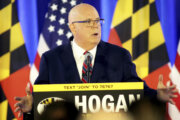Excerpts from recent editorials in the United States and abroad:
April 26
The Wall Street Journal on a potential Trump-Biden debate
Is President Biden going to debate Donald Trump as the November election nears? “I am. Somewhere. I don’t know when,” Mr. Biden said Friday in an interview with Howard Stern. “I’m happy to debate him.” Nice to hear, though we’ll believe it when we see it.
If the 81-year-old President wants to skip the stage this fall, Mr. Trump’s refusal to debate his GOP primary opponents has handed Mr. Biden an easy excuse. Now Mr. Trump, who for the record is 77, is demanding to debate early and often, because he wants to suggest that Mr. Biden isn’t up to taking hard questions.
Well, is he? Since Mr. Biden took office, according to Politico, he has given interviews to only two print reporters. He speaks only to friendly venues like Mr. Stern’s radio show. (We’re available for an interview on foreign or economic policy, sir.) Meanwhile, Axios reported Friday that Mr. Biden no longer walks solo to Marine One on the White House lawn. Instead he’s surrounded by a phalanx of aides because advisers worry that “videos of Biden walking and shuffling alone—especially across the grass—have highlighted his age.”
Mr. Biden’s forceful performance at the State of the Union was designed to dispel the idea that his next move ought to be retirement. Yet 63% of voters still think his public appearances “give credibility to the fears about his age and memory,” the Harvard-Harris poll found in March. Only 37% said Mr. Biden’s appearances are “just fine.”
The White House insists that despite his age Mr. Biden is as vigorous and capable as ever. When the New York Post asked why Mr. Biden has taken to wearing tennis shoes with his suits, this was the comment from deputy press secretary Andrew Bates: “I know y’all aren’t partial to presidents who exercise, but don’t worry—you’ll get used to it.” More likely they’re afraid the President will fall.
Mr. Trump is ready to debate “ANYWHERE, ANYTIME, ANYPLACE,” he wrote on the internet Friday. “I suggest Monday Evening, Tuesday Evening, or Wednesday Evening.” Mr. Biden won’t take that bait, but if he truly wants to debate, he should formally agree to somewhere, sometime, someplace. Otherwise voters might decide Mr. Trump is right about him.
___
April 26
The Los Angeles Times on sending armed troops to peaceful protests
On Wednesday during a visit to Columbia University, House Speaker Mike Johnson (R-La.) warned that if the wave of protests against Israel’s U.S.-funded war in Gaza on college campuses, including UCLA and USC, is not contained quickly, “there is an appropriate time for the National Guard. We have to bring order to these campuses.”
How troubling that the man who is the third in line to the presidency seems to think that it’s OK to silence largely peaceful student protests by sending in armed troops.
It’s a terrible idea, with a deadly history in the U.S. It was the Ohio National Guard that killed four unarmed students and wounded nine others at a rally against the Vietnam War at Kent State University in 1970. Since then, there have been uncountable examples of armed responses to nonviolent activities ending with innocent people getting hurt or killed.
Sens. Tom Cotton (R-Ark.) and Josh Hawley (R-Mo.) have called on President Biden to deploy the National Guard to quash pro-Palestinian protests. Republican state lawmakers in New York want Gov. Kathy Hochul to deploy the National Guard to Columbia University. And more than two dozen Republican senators signed a letter urging the Biden administration to “restore order to campuses” by using federal law enforcement, prosecution and deportation against “the outbreak of anti-Semitic, pro-terrorist mobs.”
Never mind that they are unfairly assigning racist motives to thousands of people protesting the killing of more than 34,000 Palestinian people, most of them women and children. It’s clear that these Republican politicians are less concerned with the wave of antiwar protests than using them for their own political ends.
Johnson also threatened to use his power as speaker to punish colleges that don’t eject protesters by withholding federal education funding. “If these campuses cannot get control of this problem, they do not deserve taxpayer dollars.”
This kind of tough talk is especially rich coming from a man who has shown no interest in cracking down on the most serious threat to our democracy: President Trump’s lies, and his supporters’ use of violence to try to prevent the peaceful transfer of power.
To the contrary, Johnson played a key role in helping Trump try to overturn the election. He has suggested the Jan. 6 insurrectionists who participated in the attack on the Capitol were innocent people who “just happened to be walking through the building ” and wanted to blur their faces from video so they could not be charged with crimes.
It seems that his send-in-the-troops mentality applies only to some Americans.
Part of living in a free society is accepting the right of others to speak out and protest, even when you don’t agree with them.
How someone in power responds to 1st Amendment rights being exercised in criticism of the government says a lot about what they value. Republicans’ eagerness to deploy armed troops to quash peaceful protests suggests that they don’t really believe in free speech after all.
___
April 24
The Guardian on the predatory nature of globalization
Developing nations have long complained that globalisation has enthroned western currencies in such a way as to subsidise living standards in the rich world. Last year, Brazil, Russia, India, China and South Africa – the Brics – even talked of an alternative common currency to replace the dollar. Wealthy countries, perhaps, think that their ambitious goals for aid defuse arguments over their “ exorbitant privilege ”.
As TS Eliot put it, “between the idea and the reality … falls the shadow”. A paper out last week calculates that the bottom four-fifths of humanity finance the richest fifth to the tune of $660bn a year. The reason, say Gastón Nievas and Alice Sodano of the Paris School of Economics, is that wealthy countries have become the world’s bankers, able to squeeze debtors. Poor nations borrow in rich-world currencies because they run deficits in energy and food, while exporting low-value goods relative to their imports. Markets are liberalised in poor countries and profits flow to the global north.
The US is the biggest winner, with the eurozone being a close second, draining $160bn annually from the poor. Every year, developing nations forgo 2%-3% of their GDP, sums better spent on education, health and the environment. Globalisation’s big winners in the developing world have lost out too. The gains of the G8 group of industrialised nations are “paid by trade surpluses and financial losses of the Brics”.
Last year in Shanghai, Brazil’s president, Luiz Inácio Lula da Silva, questioned the dollar’s dominance. Some of this unease is geopolitical. The US government has weaponised the dollar to sanction enemies such as Iran, Cuba and Afghanistan. Capitol Hill voted to seize frozen Russian central bank assets sitting in US banks to rebuild Ukraine. Wary of western power, many nations are looking for alternatives.
Michael Pettis of Peking University says the question Brazil should ask is what assets it should invest in with the proceeds of its exports. Any nation that tries to displace the dollar faces disruptive adjustments. It would be better, surely, to avoid perpetual indebtedness in foreign currencies by, say, building a nation’s capacity to meet its needs rather than becoming reliant on high-value imports.
The current model also doesn’t work for rich-world voters. By incentivising inflows, the US financial sector gets the clout to distort government priorities. Encouraging the purchase of US assets, for example, sees the US current account deficit rise through reduced income from a smaller manufacturing base and higher spending on imports. Rich countries with a big trade surplus, like Germany, respond by constraining domestic demand – and lowering wages – to remain competitive. This, as the former European Central Bank president Mario Draghi admitted this month, has been a self-defeating strategy.
The climate transition is seeing wealthier countries attempt active industrial policies at home. Though welcome, this pivot is morally untenable as long as poor nations are prevented from doing the same.
The economist Fadhel Kaboub suggests a way out: the World Bank and IMF could lend money to historical polluters to help them pay for their climate debt to poor nations. John Maynard Keynes foresaw the current predicament. In July 1944, with war raging, he proposed at the Bretton Woods conference a scheme to penalise countries that held too much of a reserve currency as severely as those that ran deficits. This was vetoed by the US. Eighty years later, the resolution of the dilemma that Keynes identified remains as urgent as it is elusive.
___
April 25
The Washington Post on SCOTUS and presidential immunity
It would seem to go without saying that the president, tasked with faithfully executing the laws of the United States, cannot also violate any one of those laws without fear of criminal prosecution after leaving office. Nonetheless, the Supreme Court decided this question is serious enough as it relates to Donald Trump that it must deliver an answer, rather than leaving the matter to the lower courts to state the obvious. Yet Trump v. United States is an easy case; the justices should not belabor the issue more than they already have.
Thursday’s oral argument in the case revolved around whether Mr. Trump can claim absolute immunity for his conduct while president, including for the alleged crimes in Justice Department special counsel Jack Smith’s election fraud case. Thankfully, most of the justices appeared skeptical that the president may avoid prosecution for any action he takes on the job.
From there, however, things got complicated. Assuming a president can be prosecuted for private or personal conduct — committing perjury to cover up an affair, say — can he be prosecuted for official conduct? What even counts as “official”? The court decided in Nixon v. Fitzgerald that ex-presidents have immunity from civil suits for anything within the “outer perimeter” of their duties. This generous standard enables the commander in chief to do the job without fear of countless frivolous lawsuits.
There are more guards against frivolous prosecutions than frivolous lawsuits, so the level of protection the executive needs from post-presidency criminal proceedings should be correspondingly lower — though, most of the justices seemed persuaded, not nonexistent. Even the Justice Department concedes that presidents can’t be criminally liable for certain “core conduct” listed in Article II of the Constitution. The justices contemplated President Barack Obama being dragged before judge and jury for conducting a drone strike against a terrorist.
On the other hand, the justices considered a hypothetical borrowed from D.C. Circuit Court of Appeals Judge Florence Y. Pan: “Could a president order SEAL Team 6 to assassinate a political rival?”
The court explored many ways to distinguish between the former hypothetical and the latter. Courts could consider whether the president’s motive or intent in taking an official action was to serve himself rather than the public. Judges could examine whether the president reasonably should have known a given action was illegal — because of contrary advice from his attorney general, for example, or because it’s just that obvious.
But amid all the nuance, the Supreme Court might be missing the point. Not only would Mr. Trump’s alleged conduct surrounding the 2020 election fail an intent test, or a reasonableness test governing when official acts are criminal, but almost all of the acts included in prosecutors’ complaint against Mr. Trump are also clearly not official. Nothing in the presidential job description relates to certifying the winner of the election, and, as Justice Department counsel Michael Dreeben pointed out, “It seems likely that the framers designed the Constitution that way.” And, as even opposing counsel D. John Sauer admitted, there is no obligation as chief executive to call up the Georgia secretary of state and ask him to “find” the votes necessary to declare a false victory in the state.
The Supreme Court could devise a complex new standard governing former presidents’ criminal liability, then demand that Trump trial Judge Tanya S. Chutkan engage in further analysis before the already much-delayed trial she’s overseeing can proceed. Or it could simply find that actions described in Mr. Trump’s indictment lie outside any plausible scope of presidential immunity. The justices might find the former approach more comfortable. But trying to set standards in such murky legal circumstances can have unintended consequences — even enabling dubious executive behavior once presidents know more clearly what they can get away with. By the same token, the court might also chill legitimate executive action, depending on how it worded such a ruling.
Declining to sort through the particulars of Mr. Trump’s case would not actually allow the court to avoid getting embroiled in his prosecution — quite the opposite. Giving him the time he wants would put a thumb on the scales in a way it would not for any other defendant: His legal strategy hasn’t been to win his case so much as to delay it. That way, if he ends up back in the Oval Office next winter, he could order the charges dropped.
Mr. Trump can press an immunity claim at the Supreme Court only because he is a unique defendant: a former president being charged with crimes. But his unique status also means it’s unusually important to move quickly. Pretending, after all these extraordinary legal proceedings, that he’s just any other defendant — by ignoring how delay might deny the public a trial — would not help the court appear impartial.
ONLINE: https://www.washingtonpost.com/opinions/2024/04/25/supreme-court-trump-election-fraud/
___
April 28
China Daily on U.S. role in Israel-Hamas war
Representatives of the Palestinian Fatah movement and the Islamic Resistance Movement, or Hamas, met in Beijing on Friday to discuss ending the internal divisions in Palestine. This latest development, although not confirmed by Beijing, not only contributes to forging Palestinian unity but also is conducive to defusing the ongoing crisis in the Middle East.
Ahead of the meeting in an interview with the media on Thursday, Khalil Al-Hayya, a leading member of Hamas’ political bureau, said the movement was ready to disarm and transition into a political party that is part of a unified Palestinian government on condition that an independent Palestinian state is established along the pre-1967 borders in accordance with the international resolutions.
China has taken a low-key approach to the meeting, with the Foreign Ministry simply saying that the country consistently supports internal reconciliation among the different Palestinian factions through dialogue and firmly backs strengthening the internal unity in Palestine.
The meeting is a clear indication that China is making every effort to resolve the crisis in Gaza.
By seeking to facilitate reconciliation between the two Palestinian factions, China hopes the political forces of Palestine can show greater solidarity in promoting a political solution to the conflict that upholds the legitimate rights and political status of Palestine with the support of the international community.
With the Gaza conflict still ongoing, China is maintaining close communication with all relevant parties, actively participating in United Nations Security Council consultations, and pushing for efforts to de-escalate the situation and promote peace talks.
Last month, Chinese diplomat Wang Kejian visited Egypt, Palestine, Israel and Qatar, which also included a meeting with the head of Hamas’ political bureau, Ismail Haniyeh, during his visit to Qatar. The latest development in Beijing was only made possible thanks to a series of such diplomatic mediation efforts.
What China has done so far in its efforts to resolve the Israel-Palestine conflict, which includes promoting Palestinian unity, upholding justice at the United Nations Security Council and calling for an immediate cease-fire, stands in stark contrast to those who have constantly fanned the flames of the conflict.
US President Joe Biden on Wednesday signed into law legislation that includes $26 billion in assistance for Israel, the majority of which is earmarked for military spending. Turning a deaf ear to domestic and international calls for it to press Israel to stop the brutal killing of Palestinian civilians, the Biden administration has continued to get blood on its hands by supplying arms to Israel and repeatedly blocking the UNSC’s efforts to call for a cease-fire. Earlier this month, it vetoed a UNSC draft resolution to grant full UN membership to the State of Palestine despite its alleged support of the two-state solution.
To date, more than 34,200 Palestinians have been killed in Gaza since Israel launched its military offensive against Hamas. The conflict has not only caused a humanitarian catastrophe but also spilled over to other parts of the region, dragging more parties into the fray.
At present, apart from losing the moral high ground because of its callous support of Israel’s relentless military offensive in Gaza the US itself is feeling a strong backlash from what it has sowed in the Middle East: Many university campuses in the US are convulsed in chaos as students stage pro-Palestine protests. Hundreds of demonstrators have been arrested amid allegations of police brutality, all triggered by the US’ lopsided policy on the ongoing conflict.
The Gaza conflict and its resulting effects show once again that the perpetual denial of the legitimate national rights of the Palestinian people is the root cause of the Palestinian question. It is high time the US stopped being part of the problem with its blind support of Israel and instead became part of the solution by putting its weight behind international peace efforts and joining hands with those countries, such as China, that are actually working to try and secure a meaningful cease-fire in Gaza and a long-term solution to the Israel-Palestine conflict through dialogue and consultations.
ONLINE: https://www.chinadaily.com.cn/a/202404/28/WS662e457fa31082fc043c47e1.html
Copyright © 2024 The Associated Press. All rights reserved. This material may not be published, broadcast, written or redistributed.







